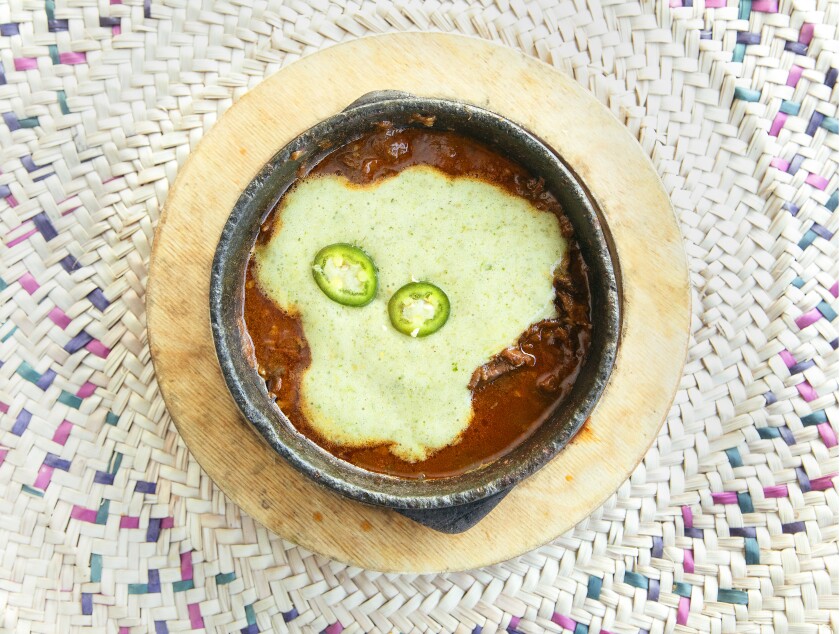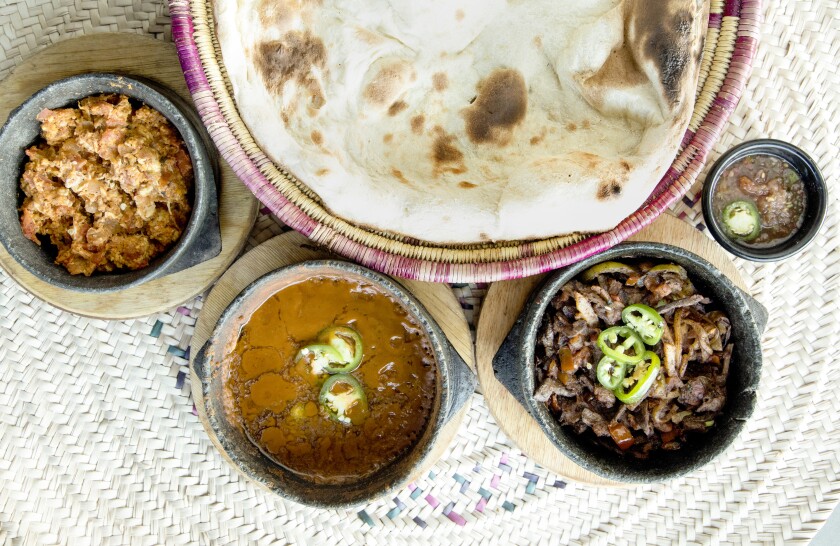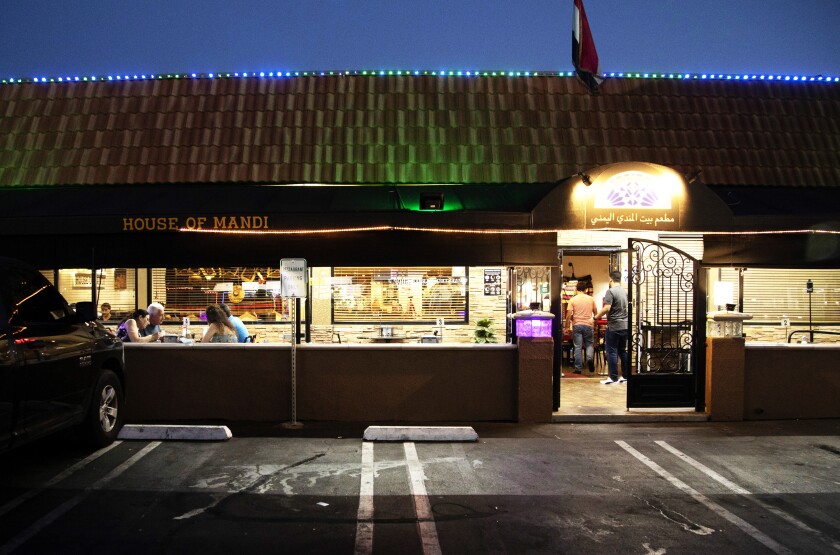At House of Mandi in Anaheim, a young server requires both hands to hoist a platter full of gold. The menu labels it “No. 7,” a hulking tray of rice, chicken and lamb stained in sunset shades of turmeric and saffron.
So many meaty, half-buried forms jut out from the grains that the eyes have trouble landing. Where to begin? Probably with a chicken leg, its skin crisp-soft and nearly orange from a cumin-forward spice rub. Next, reach for a forkful of lamb tugged from a shank and coupled with a stray almond sliver. Spoon sides of minted yogurt and tomato-chile chutney over the rice, making it as saucy as you like and tinkering with interplays of hot and cool. This is a place to slow down. Few customers appear rushed.
Mandi (the name for this feast) originates in Hadhramaut, Yemen, a region of craggy hills and fertile valleys in the country’s eastern-central region; it stretches to the coast of the Gulf of Aden, which flows into the Arabian Sea. Similar to covered-oven traditions that stretch back to the Mayan culture, the meats and rice for mandi have historically been cooked in pits over coals. “Underground,” Sarem Mohamed said in emphasis.
Mohamed runs the restaurant with his family. Their modern adaptation of mandi might lack the smoldering fragrance of the original method, but the meats emerge uniformly lush and a hint of smokiness threads through the spices.

Fahsa, a stew of shredded lamb and vegetables that comes to the table boiling and garnished with hilba (ground and soaked fenugreek beaten to the texture of whipped cream).
(Myung J. Chun / Los Angeles Times)
House of Mandi opened in October. It anchors one end of the U-shaped Little Arabia Plaza, in the space that housed Olive Tree for 15 years before it closed last spring, sitting catty-cornered from the wonderful Lebanese bakery Forn Al Hara and its za’atar-varnished manaeesh. In the surrounding few blocks, also unofficially dubbed “Little Arabia,” one can crunch through the bright green center of Palestinian-style falafel at Kareem’s; consider the textural shifts between grilled, baked and fried versions of Syrian kibbeh at Aleppo’s Kitchen; and satisfy sweet cravings with a gooey, crunchy slab of pastry from Knafeh Cafe.
Yemini cooking, its dishes indelibly scented by the trade routes that ran through the Arabian Peninsula and along the Red Sea, has been rare in Southern California restaurants. (A boomlet may be stirring, though: Monasaba, a small chain of Yemeni restaurants based in Canada, launched in nearby Stanton in April.) Without question House of Mandi concentrates on its namesake dish: There are 10 versions that vary in size and in combinations of meats, including a peppery variation of lamb called haneeth, served wrapped in foil to preserve its succulence.
But the menu goes further, surveying a gratifying swath of stews and breakfast staples. During one lunch a Jordanian friend who knows Yemeni cuisine well steered our order away from the overt, substantial pleasures of mandi; he wanted us to have the head and stomach space to give other specialties their due. He pointed me toward fahsa, lamb stew rushed to the table roiling volcanically in a clay pot, the way soondubu arrives erupting in Korean restaurants.
Floating atop the stew, melting but also astonishingly intact, is hilba, a scallion-flecked condiment made by soaking ground fenugreek in water and then beating it to the fluffy consistency of Cool Whip. Dairy-free cooks in search of an improbably creamy, savory garnish might want to experiment further with this miracle of science. I noticed instructions for hilba in “Sifratna,” an excellent cookbook on Yemeni food by Amjaad Al Hussain.

Breakfast dishes at House of Mandi include shakshuka, foul and lamb liver.
(Myung J. Chun / Los Angeles Times)
Once the fahsa cools you might eat it half with a spoon and half with the Yemeni flatbread delivered and replaced frequently by the staff. Wider than a basketball hoop and blistered near the center, it’s best when it’s as fresh from the oven as your fingers can handle.
As with the mandi, the kitchen presents variations on themes with stews: vegetable with ground beef, lamb and vegetable; all-vegetable; and shrimp with tomato and garlic. Each appears in its small bubbling cauldron, most graced with hilba.
Shafoot, a salad of herbed yogurt and cucumbers layered over delicate crepes that bring to mind extra-thin injera, moves in like a cold front between mouthfuls of stew.
The restaurant opens at 11 a.m.; its breakfast options appeal any time of day. (Al Hussain notes in her book that her family frequently enjoys morning dishes for dinner.) Ubiquitous shakshouka comes in scrambled form, the medium-firm curds gripping diced tomatoes and onions. A soothing, pureed version of foul (dried fava beans) with a generous glug of olive oil is ideal for dipping bread. In this mix I also love an order of spiced lamb liver sauteed with onions and tomatoes. Its iron richness rings strong and true among the other flavors.
The menu repeatedly refers to “Yemeni sauce.” That’s zahawiq, also called salata harra, a spicy condiment that’s more widely known these days as zhoug — its adoptive name in Israel and throughout much of the Middle East. Many versions blaze with green chile; House of Mandi uses tomato and, while it has some flicker, it’s easy to use liberally.

House of Mandi resides in Little Arabia plaza in Anaheim.
(Myung J. Chun / Los Angeles Times)
I mentioned most customers come for an unhurried meal. The pace of the restaurant is leisurely in general; if you need to be in and out in a flash, call ahead for carryout. Otherwise, settle in. Most of the dining space has Western-style tables and chairs. A core clientele of families and friends gravitate to the Yemeni-style floor seating in one corner, relaxing on cushions patterned in red, black and white. They linger over platters, often finishing with sips of black tea piney from cardamom or strong coffee served with dates.
If you’re driving back to Los Angeles after banqueting on a blur of rice and bread and meats, I recommend the jolt of caffeine.
***
House of Mandi
518 S. Brookhurst St. Unit 1, Anaheim, (657) 220-5272, houseofmandi-yemenirestaurant.com
Prices: Salads $2.99-$9.99, stews $12.99-$19.99, mandi $11.99-$469.99 (for large groups)
Details: 11:30 a.m.-9:30 p.m. Monday-Thursday; 11:30 a.m.-10 p.m. Friday-Saturday. No alcohol. Credit cards accepted. Lot parking.
Recommended dishes: Mandi No. 7 (for a small group), fahsa, shafoot, foul, sauteed lamb liver.
window.fbAsyncInit = function() { FB.init({
appId : '134435029966155',
xfbml : true, version : 'v2.9' }); };
(function(d, s, id){ var js, fjs = d.getElementsByTagName(s)[0]; if (d.getElementById(id)) {return;} js = d.createElement(s); js.id = id; js.src = "https://connect.facebook.net/en_US/sdk.js"; fjs.parentNode.insertBefore(js, fjs); }(document, 'script', 'facebook-jssdk'));
Stay connected with us on social media platform for instant update click here to join our Twitter, & Facebook
We are now on Telegram. Click here to join our channel (@TechiUpdate) and stay updated with the latest Technology headlines.
For all the latest Life Style News Click Here
For the latest news and updates, follow us on Google News.
